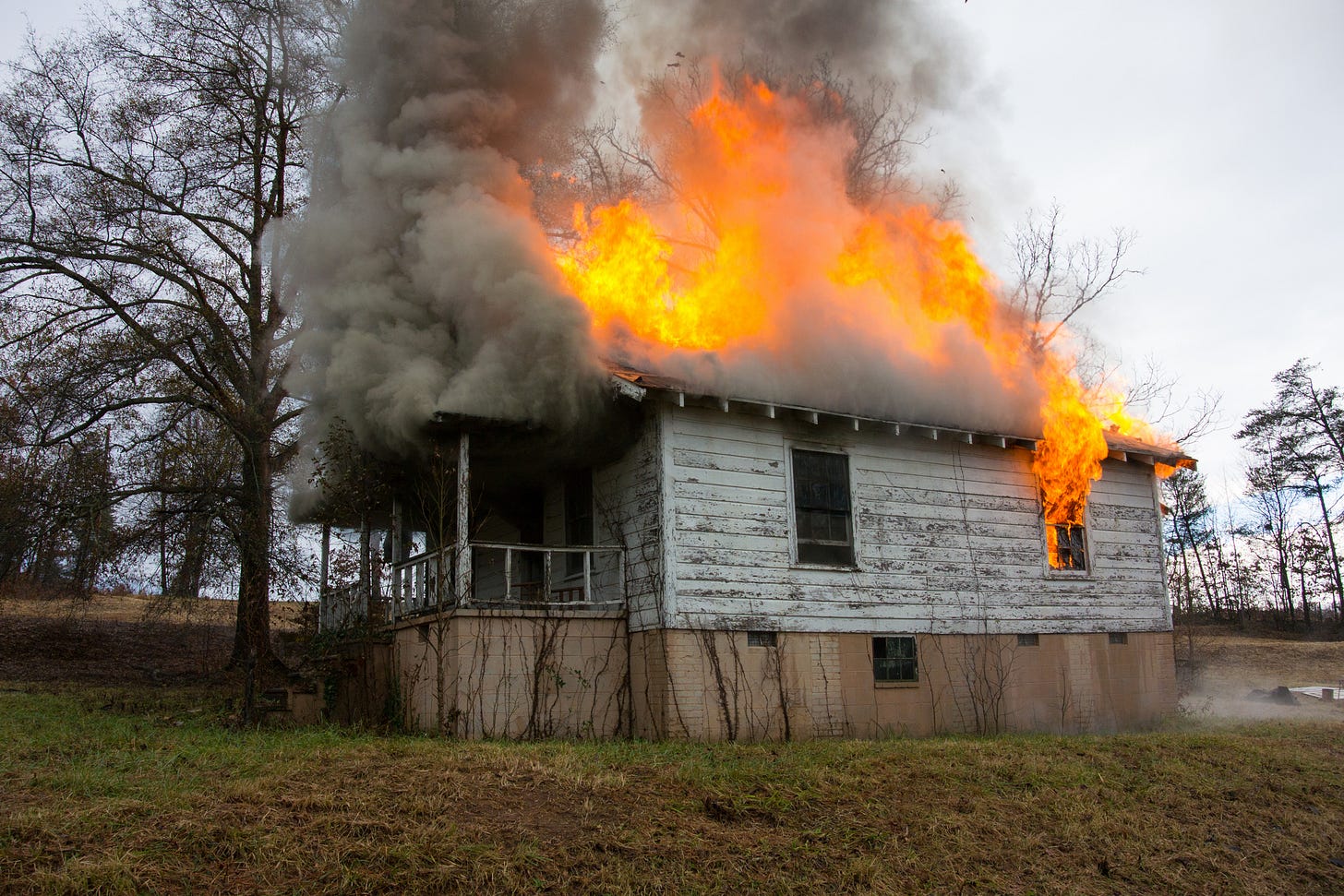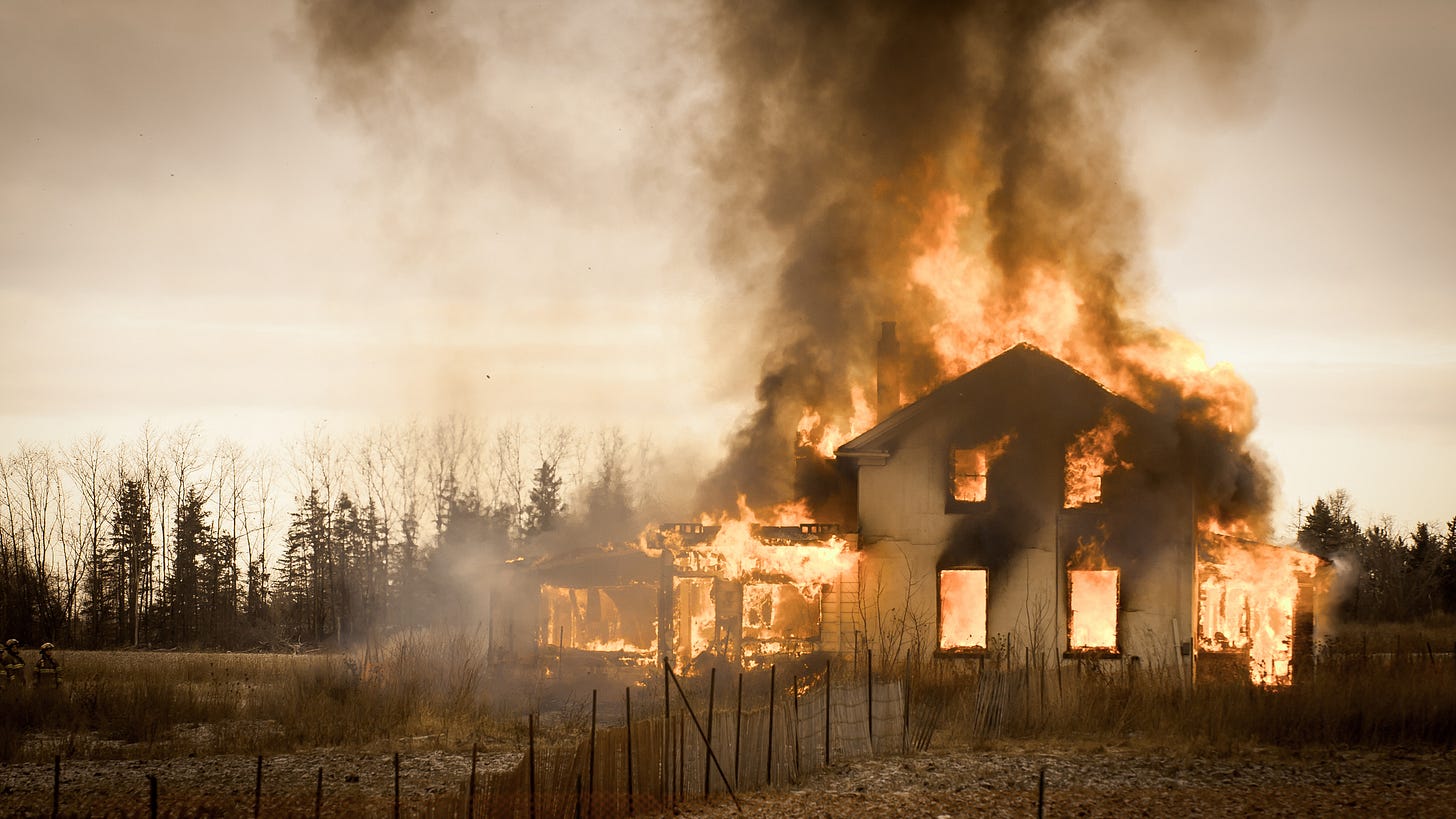Burning Down the House (again)
Avoiding burnout from the drumbeat of bad news
This month should be a doozy. Special Counsel Jack Smith may have additional felony charges in the classified documents case against Donald Trump. Fulton County District Attorney Fani Willis may soon announce an indictment for Trump’s effort in Georgia to fraudulently steal the 2020 election. Talk is heating up that Smith may also file charges for the fake elector conspiracy to illegally keep Trump in power.
Did you hear the criminal defendant at the center of all this is the GOP’s leading candidate for president—maybe not despite all of this but because of it? Have you noticed that it takes a lot of energy to maintain sanity while this career criminal, bent on retribution, continues to lie, threaten prosecutors, fuel his cult and otherwise mouth off violently?
Even with all of this swirling about—Is there another shoe to drop from the corrupt ideologues at the Supreme Court?—I hope you can imagine it makes sense to take a mental health break to recharge batteries. That’s my plan—to travel, to see new things, to be a little quiet—to ready myself for the coming months and a predictably intense year ahead as another presidential election season heats up.
You can be sure I won’t stop publishing in these weeks while I’m traveling. If a big story breaks, wherever I am, I expect to post some thoughts. I’m also planning to share some earlier dispatches that I think are worth revisiting, as well as serve up some new Saturday discussion prompts. Soon, I will be welcoming a veteran journalist and insightful observer of the media and the body politic to contribute several pieces for us (more to come on this). So, too, you might hear from me when I’m in the same European city as President Biden when he’s meeting NATO allies.
All that said, I hope you’ll read and reflect on this post about the potential of and danger of burnout. Honestly, I find it hard to take time off—a common failing among many Americans—but there’s little doubt a vacation is critical to sustain this work on America, America for the long haul. That means this year and many years ahead.
I’m not burned out exactly, at least not the way the professionals talk about it. The World Health Organization details three symptoms: “Feelings of energy depletion or exhaustion; increased mental distance from one’s job, or feelings of negativism or cynicism related to one’s job; reduced professional efficacy.”
Yes, I have moments of “energy depletion” and feelings of exhaustion. (Who doesn’t?) But rather than feeling disconnected or deterred by “negativism,” which would undermine my ability to write and do my job, I remain tapped in, committed, driven. If I didn’t feel this work was necessary or valuable, you can be sure that I wouldn’t keep doing it. I suspect you can tell by my writing that I am motivated by passion and a sense of urgency about the state of our country.
And yet.
It’s good to take a break sometimes. Right? I understand this notion intellectually, but I’m not very good at practicing it. I know I’m not alone in this. As I noted nearly a year ago, Americans in 2018 did not use 768 million days of paid time off. That’s an awful lot of time that could have been spent kicking back with families or friends, traveling or (God forbid) just not working.
Wouldn’t it be great if all those hours could have been handed over to nurses and doctors and delivery drivers and grocery store clerks and other front-line workers who’ve helped us ride out the storm of COVID-19?
But I have noticed in recent weeks that the constant drumbeat of bad news, driven by the feverous pitch of bad actors bent on burning down our house—by stripping human rights, attempting to overthrow our government, refusing to act after more children are gunned down, remaining silent after yet another racist mass murder, siding with Vladimir Putin, allying with other shameless nationalists and extremists, and shoving our democracy toward the ash heap of history—has begun to tire me out.
At least a little. At least enough to notice that, lately, I can be more interested in turning the TV off than in learning one more thing.
Usually, I don’t struggle to find something to say. But there have been moments when I’ve wondered whether there really is anything else to say that can break through and make a difference. Is that a form of burnout—or at least my version of it?
In an excellent cultural history of burnout published earlier this year in The Washington Post, author Jonathan Malesic pointed to a period of “broken idealism” in the early 1970s as one explanation for a growing sense of burnout.
Malesic, who recently published the book, The End of Burnout, described a New York psychologist, Herbert Freudenberger, who developed in those same years a list of symptoms to explain the condition. These included, he wrote, “‘exhaustion, being unable to shake a lingering cold, suffering from frequent headaches and gastrointestinal disturbances, sleeplessness and shortness of breath,’ as well as ‘quickness to anger,’ paranoia, overconfidence, cynicism and isolation.” Fast-forward to a 2021 survey that cited burnout as the top reason people were quitting or changing their jobs.
But let’s linger for a moment on Malesic’s observation that Bob Dylan captured this emerging awareness of burnout in his 1974 song “Shelter from the Storm” from his Blood on the Tracks album. The song includes the line “burned out from exhaustion,” distilling, Malesic notes, “a significant cultural moment…when burnout as we know it first gained scientific legitimacy and broad public attention.”
Consider also the broader context of the burnout line from Dylan:
I was burned out from exhaustion, buried in the hail
Poisoned in the bushes an' blown out on the trail
Hunted like a crocodile, ravaged in the corn
Come in, she said
I'll give ya shelter from the storm
Shelter from the storm. That sounds to me like the antidote to the condition, a chance to take a break from the madness outside, a change of scene, a moment to get warm before returning to the elements.
In the coming weeks, I will be traveling overseas, reveling in a change of venue, recharging my batteries. On several of my stops, I plan to share with you insights from the locals on issues of the day. I may also share some snapshots from my visits (and stop whatever I’m doing when the January 6 committee televises its hearings to briefly share my thoughts). I also will republish essays from the last year that still feel particularly relevant and worth revisiting.
As always, you, dear reader, and America, America will not drift far from my thoughts. But I’m pretty darn sure that the time away—with a chance to see some different sights, eat some different foods, hear some other languages, discuss some other views far from the madding crowd in America—will go a long way to refresh me for the season ahead. Maybe I will convince a few of you to do the same.
America, America is sustained by paid subscriptions, making it possible to keep nearly all the writing available for everyone. If you’re not already a paid subscriber, I hope you’ll consider becoming one.




We cannot tell you how grateful we are for your Substack post this morning. We've been staying off news since June 14 with the exception of our air quality issues and climate change. Each morning we clean out our emails. Many of the emails have gone unread. All of the acrimony in society, the indictments, the fake news, the lies, and the trials are going to continue for many months, if not years. We care about all of this but are completely out of intellectual and emotional energy to face this situation right now. Please enjoy your travels. New adventures, nature, art, and music all heal. You do not even need to know what time it is unless you have a dinner reservation, are meeting old friends, or need to be on time for a train or plane trip. You expressed our feelings so eloquently. We will continue to look for your posts but please be sure to take time off. Thank you.
Dear Steven, Thank you for this deeply meaningful piece at a critical time.